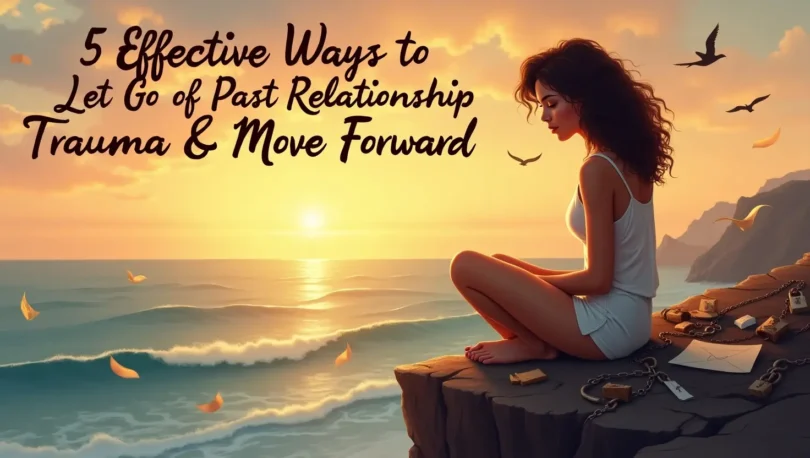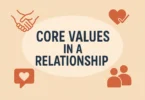Healing from past relationship trauma can feel like an overwhelming and difficult journey, but it’s an essential step toward reclaiming your happiness and peace of mind. Whether it’s a breakup, a toxic relationship, or emotional scars from past experiences, the effects of unresolved trauma can linger, affecting how you view yourself and future relationships. Letting go of the past is not about forgetting what happened, but rather, about freeing yourself from the emotional weight that holds you back from living fully.
In this blog post, we’ll explore 5 effective ways to let go of past relationship trauma and move forward. These practical strategies, rooted in emotional healing and self-care, will help you reclaim your inner peace, foster personal growth, and rebuild a life filled with healthier relationships and renewed confidence. While the process of healing takes time, embracing these methods can guide you toward emotional freedom and a brighter, more fulfilling future.
Headlines
Understanding Relationship Trauma and Its Impact
- What is Relationship Trauma?
- Signs of Relationship Trauma
- How Relationship Trauma Affects Mental and Emotional Health
5 Effective Ways to Let Go of Relationship Trauma
Moving Forward and Embracing a Better Future
- Recognizing the Power of Moving On
- Embracing Personal Growth and Self-Discovery
- Setting Healthy Boundaries in New Relationships
- Fostering a Positive Mindset and Building Resilience
- Embracing New Relationships and Experiences
Understanding Relationship Trauma and Its Impact
Relationship trauma refers to the emotional scars and psychological effects left by harmful or unhealthy relationships. Whether it’s caused by an abusive partner, a painful breakup, or unresolved issues from a past relationship, trauma can have long-lasting effects on a person’s mental and emotional well-being. Understanding what relationship trauma is and how it impacts you is the first step in the healing process.
What is Relationship Trauma?
Relationship trauma occurs when someone experiences significant emotional, psychological, or physical distress during or after a relationship. This can result from many different scenarios, such as:
- Emotional abuse (e.g., manipulation, gaslighting, constant criticism)
- Physical abuse or violence
- Betrayal (e.g., infidelity or deceit)
- Toxic patterns (e.g., codependency, controlling behavior, neglect)
- Abandonment or rejection, whether physical or emotional
These experiences can leave deep emotional wounds, often resulting in feelings of shame, fear, distrust, and sadness. When these feelings are left unaddressed, they can create long-term issues in one’s ability to form healthy relationships and maintain emotional balance.
Signs of Relationship Trauma
Recognizing the signs of relationship trauma is important to understanding how it may be affecting you. Some common symptoms include:
- Trust issues: Difficulty trusting others or constantly feeling paranoid that someone will betray you, even in new relationships.
- Low self-esteem: Feelings of worthlessness or inadequacy, often stemming from emotional abuse or manipulation in a past relationship.
- Fear of vulnerability: Reluctance to open up to others emotionally, fearing that it will lead to hurt or rejection.
- Repetitive unhealthy patterns: Entering into relationships that are emotionally draining, toxic, or abusive, without realizing the cycle.
- Difficulty moving on: Feeling stuck in the past or unable to let go of the pain, even after the relationship has ended.
These signs often arise because your mind and body are trying to protect you from further emotional harm. Unfortunately, without proper healing, these defensive mechanisms can prevent you from moving forward and experiencing healthy, fulfilling relationships in the future.
How Relationship Trauma Affects Mental and Emotional Health
Relationship trauma doesn’t just affect your emotional state; it can also have a profound impact on your mental health and overall well-being. The aftermath of traumatic relationships can lead to:
- Anxiety and depression: The feelings of helplessness, fear, and sadness that often accompany trauma can result in anxiety disorders or clinical depression.
- Post-Traumatic Stress Disorder (PTSD): In more severe cases, individuals may experience flashbacks, nightmares, or intrusive thoughts related to past traumatic events.
- Attachment issues: Relationship trauma can impact the way you attach to others. For instance, you may struggle with forming secure attachments, leading to anxious attachment or avoidant behaviors in new relationships.
- Emotional numbness or detachment: Some people experience emotional shutdowns or disconnect from their feelings in an attempt to cope with the overwhelming pain from the past.
The Importance of Emotional Healing
Healing from relationship trauma is not just about “getting over it.” It’s about fully processing the emotions associated with the trauma and learning how to move forward without letting it define your future. This process of healing involves:
- Acknowledging and accepting your pain: Understanding that your feelings are valid and giving yourself permission to grieve.
- Gaining emotional intelligence: Developing the skills to recognize and manage your emotions in healthy ways.
- Forgiving yourself and others: While this might seem difficult, forgiving yourself and the people involved in your past relationships is crucial for emotional release.
The Road to Recovery
Understanding relationship trauma is essential for your recovery journey. It’s important to recognize the emotional toll it can take and how deeply it can affect your sense of self, your future relationships, and your overall happiness. However, by identifying the signs and accepting the need for healing, you are taking the first step toward emotional freedom. With the right tools and support, it is absolutely possible to let go of past relationship trauma and move forward into a healthier, happier future.
In the following sections, we will explore 5 effective ways to let go of past relationship trauma that will guide you toward emotional healing and a fresh start.
5 Effective Ways to Let Go of Relationship Trauma
Healing from relationship trauma is not an overnight process—it requires time, patience, and a commitment to personal growth. However, by actively applying practical strategies, you can begin to release the emotional weight of past experiences and move forward. In this section, we’ll explore 5 effective ways to let go of relationship trauma that will help you reclaim your emotional well-being, nurture self-love, and build a better future.
1. Seek Professional Help (Therapy & Counseling)
One of the most powerful ways to heal from relationship trauma is by seeking professional help. Therapy offers a safe, supportive space to unpack your emotions, explore your past experiences, and gain valuable insights into your emotional wounds. Working with a therapist can help you:
- Process deep-seated pain: Sometimes, trauma is buried so deeply that it’s hard to confront on your own. Therapy can guide you through processing unresolved emotions, preventing them from continuing to affect your life.
- Challenge negative thought patterns: Often, trauma leads to distorted thinking, such as believing you’re unworthy of love or fearing future relationships will be just as damaging. Cognitive Behavioral Therapy (CBT) is one approach that helps change these unhealthy thought patterns and encourages healthier perspectives.
- Learn coping strategies: A therapist can teach you tools and techniques to manage overwhelming emotions, anxiety, or negative self-talk as they arise, allowing you to build emotional resilience.
If you’ve experienced significant emotional pain, professional therapy can be an invaluable tool for working through your trauma in a structured, supportive environment. Whether it’s one-on-one therapy, couples counseling, or even group therapy, taking that first step toward professional help can set the stage for your emotional healing.
2. Embrace Self-Care and Self-Love Practices
Self-care is more than just pampering yourself with a hot bath or a spa day—it’s a comprehensive approach to prioritizing your mental, emotional, and physical well-being. When recovering from relationship trauma, self-care is a vital practice for healing and building a sense of peace within yourself. Incorporating self-love and self-care into your daily routine can help you:
- Rebuild your self-esteem: Trauma often erodes your sense of worth. By taking time for self-care—whether through meditation, journaling, exercise, or other healing activities—you send a powerful message to yourself that you are deserving of love, respect, and happiness.
- Practice mindfulness: Mindfulness techniques, such as meditation or deep-breathing exercises, can help you stay present and reduce anxiety related to past trauma. By focusing on the here and now, you can break free from negative thought patterns that keep you stuck in the past.
- Establish healthy boundaries: Self-care includes knowing when to say “no” and setting boundaries that protect your emotional well-being. As you heal, you’ll learn how to recognize unhealthy relationships and avoid repeating toxic cycles in the future.
Self-love practices such as affirmations, engaging in hobbies you enjoy, and practicing gratitude can significantly accelerate your recovery. These practices help you regain a sense of inner peace and confidence, empowering you to embrace the future with optimism.
3. Practice Forgiveness and Letting Go of Grudges
Forgiveness is one of the most difficult yet powerful actions you can take when healing from relationship trauma. It doesn’t mean excusing or forgetting what happened, but rather, it’s about releasing the emotional burden of resentment and anger that keeps you tied to the past. By practicing forgiveness, you can:
- Release emotional pain: Holding onto grudges and resentment only prolongs your suffering. Forgiving yourself and others allows you to release these negative emotions, freeing you from the grip of past trauma.
- Cultivate peace and emotional freedom: When you forgive, you free yourself from the cycle of hurt, bitterness, and blame. Forgiveness allows you to move forward without carrying the emotional weight of past relationships.
- Heal your relationship with yourself: Often, people who have experienced relationship trauma struggle with self-blame or feelings of shame. Forgiving yourself is crucial to healing and rebuilding your sense of self-worth.
While forgiveness is a personal and gradual process, it’s essential to remember that it doesn’t mean reconciliation or condoning harmful behavior. Instead, it’s about freeing yourself from the emotional chains of the past so you can move on and experience healthier relationships.
4. Create a New Vision for Your Life
A major part of letting go of past relationship trauma is creating a future that feels meaningful and fulfilling. When you’ve been hurt, it’s easy to lose sight of your personal goals and desires. However, envisioning a brighter future and setting new intentions for yourself can reignite your passion and purpose. Here’s how to create a new vision:
- Set new goals: Focus on your personal growth, whether it’s advancing your career, traveling, learning new skills, or pursuing hobbies that bring you joy. Setting and achieving new goals will help you feel empowered and motivated to move forward.
- Discover your identity: Relationship trauma can sometimes lead to a loss of self-identity. Take time to reconnect with who you truly are, independent of past relationships. Explore your values, strengths, and interests, and find new ways to nurture your personal growth.
- Embrace new opportunities: Moving forward from relationship trauma means being open to new experiences, new relationships, and new possibilities. Don’t let the past dictate your future. Stay open to the potential for joy and love, even if it feels daunting at first.
Building a new vision for your life can be transformative, helping you create a future based on your own desires and aspirations rather than the limitations of past experiences.
5. Build a Support System and Join Support Groups
Healing from relationship trauma can feel isolating, but it’s crucial to have a strong support system to lean on. Surrounding yourself with understanding, compassionate people can accelerate the healing process and provide a sense of community. You can build your support system by:
- Connecting with trusted friends and family: Lean on people who make you feel safe, supported, and loved. Having people you can confide in helps prevent feelings of isolation and can provide emotional reassurance during tough times.
- Joining support groups: Online support communities or local therapy groups can be incredibly helpful. These spaces allow you to share your experiences, connect with others who understand your journey, and gain valuable insights from people who have gone through similar challenges.
- Engaging in meaningful social activities: Engage in activities that help you build positive connections, whether it’s through volunteer work, taking a class, or joining a club. These interactions can provide a sense of purpose and help you move beyond the limitations of your past trauma.
A strong support system can make all the difference in helping you feel validated, understood, and encouraged as you heal from the emotional wounds of past relationships.
By incorporating these 5 effective ways to let go of relationship trauma, you can start to heal emotionally, rebuild your sense of self, and embrace a future filled with new opportunities and healthier relationships. Each step takes time, and progress may be gradual, but with commitment and support, you can break free from the pain of the past and move forward into a brighter, more fulfilling life.
Moving Forward and Embracing a Better Future
Letting go of past relationship trauma is a deeply personal and transformative journey. While the process of healing takes time, the ultimate goal is to move forward with a renewed sense of self and optimism for the future. Embracing a better future means acknowledging the pain, learning from the past, and stepping into a life where you are empowered to create the happiness and fulfillment you deserve. This section will guide you through how to embrace a better future after releasing the emotional grip of past relationship trauma.
Recognizing the Power of Moving On
The first step in embracing a better future is understanding that moving on from past trauma is not just about “forgetting” or “getting over it.” It’s about freeing yourself from the emotional weight that has been holding you back and giving yourself the permission to thrive. Moving forward means choosing not to let past experiences dictate how you feel about yourself, your worth, or your ability to form healthy relationships. It’s a decision to reclaim your emotional freedom.
- Letting go of limiting beliefs: Trauma often leads to deeply ingrained beliefs that prevent us from moving forward. These beliefs may include thoughts like “I’m unlovable,” “All relationships are doomed,” or “I’m broken.” Moving forward involves challenging these negative beliefs and replacing them with healthier, more empowering thoughts about your future.
- Choosing to prioritize yourself: As you heal, you’ll recognize that your own well-being should always come first. Moving forward means embracing your worth and choosing to prioritize your emotional health, boundaries, and personal happiness. This mindset shift will help you build the foundation for a healthier future, whether that means pursuing personal goals, new relationships, or just enjoying a life of peace and contentment.
Embracing Personal Growth and Self-Discovery
One of the greatest benefits of healing from relationship trauma is the opportunity for personal growth and self-discovery. When you are no longer weighed down by past emotional baggage, you have the space to reconnect with your true self and explore what brings you joy, purpose, and fulfillment.
- Discover your passions: Often, after experiencing relationship trauma, people lose touch with their hobbies, interests, or passions. Moving forward means rediscovering what makes you feel alive and fulfilled. Whether it’s exploring new career paths, engaging in creative pursuits, or nurturing old hobbies, make time for what brings you joy and helps you express your true self.
- Embrace independence: A crucial part of healing from relationship trauma is learning to enjoy your own company and stand strong as an independent individual. This doesn’t mean shutting yourself off from others, but rather, embracing the idea that your happiness and well-being don’t depend on someone else. The strength you build through self-reliance will set the foundation for healthier, more balanced relationships in the future.
- Cultivate self-compassion: Self-compassion is about treating yourself with kindness, especially in moments of struggle. When you make mistakes or face setbacks, instead of criticizing yourself, practice self-love and gentle encouragement. By being compassionate toward yourself, you create a nurturing environment for growth and healing.
Setting Healthy Boundaries in New Relationships
As you move forward and begin to engage in new relationships, it’s essential to set clear, healthy boundaries that protect your emotional well-being. Relationship trauma often teaches people to tolerate unhealthy dynamics out of fear of being alone or rejected, but moving forward means learning to recognize and assert your boundaries without guilt.
- Know your worth: Recognizing your value means you won’t settle for relationships that don’t align with your needs and values. In a healthy relationship, both partners should feel respected, valued, and free to be themselves. By setting boundaries, you ensure that you don’t compromise your emotional health for the sake of others.
- Be honest and direct: Healthy communication is key to setting boundaries. Clearly expressing your needs, desires, and limitations helps to foster mutual respect and understanding in any relationship, whether romantic, familial, or platonic.
- Don’t be afraid to walk away: Moving forward means being willing to leave relationships that are no longer serving you or that mirror unhealthy patterns from the past. Trust your intuition and recognize when a relationship is no longer beneficial to your growth and well-being. Having the courage to walk away is a sign of emotional strength, not weakness.
Fostering a Positive Mindset and Building Resilience
Building resilience and maintaining a positive mindset are crucial for embracing a better future. Healing from trauma can be challenging, but maintaining a hopeful outlook will help you stay motivated and optimistic as you move forward. Resilience is not about avoiding pain but rather learning how to bounce back and keep going despite adversity.
- Focus on what you can control: The past is beyond your control, but the future is still open to possibility. Instead of focusing on what you cannot change, concentrate on the actions you can take today to improve your well-being. This might include setting small goals, taking care of your physical health, or seeking new opportunities for personal growth.
- Practice gratitude: Gratitude is a powerful tool that can shift your focus from what’s wrong to what’s right in your life. Taking time each day to reflect on things you’re grateful for helps shift your perspective toward the positive aspects of life, reinforcing a mindset of abundance and possibility.
- Be patient with yourself: Healing is a gradual process, and it’s normal to experience ups and downs. Be kind to yourself and recognize that setbacks don’t mean failure—they’re simply part of the journey toward emotional freedom and growth.
Embracing New Relationships and Experiences
As you heal and grow, you’ll eventually feel ready to open yourself to new relationships and experiences. Moving forward doesn’t mean shutting yourself off from love or companionship—it means approaching new connections with the wisdom gained from past experiences. You now have a clearer understanding of what you need, what you deserve, and how to create a healthy, balanced relationship.
- Start fresh: Don’t carry the baggage of past trauma into new relationships. While your experiences have shaped you, it’s essential to approach new relationships with a clean slate, allowing each person and experience to be unique and separate from the past.
- Communicate openly and honestly: Trust and communication are the foundation of any healthy relationship. When you enter a new relationship, be open and honest about your needs, your values, and your boundaries. By setting these expectations early on, you create a secure and trusting environment.
- Be open to love again: Even after relationship trauma, it’s important to stay open to love and new experiences. While it may take time to fully trust again, remember that not every relationship will mirror the hurt and pain of the past. Embrace the potential for new, positive experiences and growth.
Embracing the Future with Confidence
The process of letting go of past relationship trauma and moving forward is ultimately a journey of self-discovery, healing, and empowerment. By embracing a better future, you not only free yourself from the emotional weight of the past but also create space for new experiences, love, and personal growth. Remember, healing is not linear, and there may be challenges along the way. However, by adopting a mindset of resilience, focusing on your personal growth, and being kind to yourself, you can build a brighter future that is rooted in emotional freedom and self-love.
As you move forward, keep in mind that your past does not define you. You are capable of healing, growing, and creating the life you deserve. Your journey is yours to shape, and the best is yet to come.








Leave a Comment